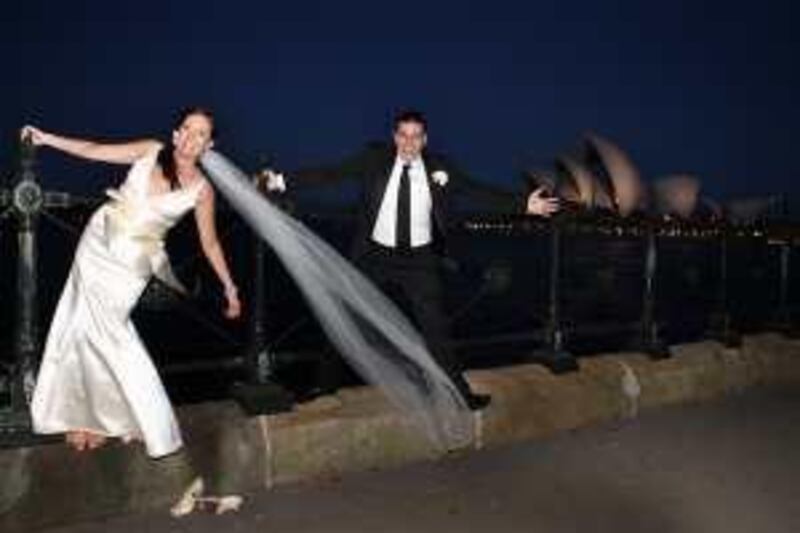SYDNEY // Marriage in Australia is back in fashion. Official figures show the number of couples tying the knot has reached a 20-year high and rates of divorce have fallen. Global uncertainty has emerged as a pivotal factor in the resurgence of marriage as Australians seek refuge in a reassuring institution. "There are a lot of things happening in the world that are out of our control. It makes people value relationships and things closer to home," explained Maxine Lowry, national vice president of the Australian Federation of Civil Celebrants, who now preside over two-thirds of the country's weddings compared to less than half in the mid-1990s. Celebrants can perform secular, non-denominational and interfaith services. Ms Lowery said she believes that they have been a modernising force helping to liberate couples from the strict requirements of religious ceremonies. "I think the enormous growth in civil celebrancy has got a fair bit to do with keeping marriage on the agenda. The option of church marriage was beginning to lose its appeal because people haven't been very connected to the church over the years," she said. Australians can take their matrimonial vows anywhere; from caves to the Great Barrier Reef and local parks to pop star-inspired nuptials on rugged mountain tops. "It enables people to have the celebration of their union in the language they want. It is about them. God isn't part of the equation. They can do it in a place of their choosing. They can do it literally anywhere. There is no limitation on when or where," Ms Lowery said. "Personally I haven't been to an Elvis-themed wedding. It wouldn't be my style, but that is not to say it doesn't suit some people." There are traditionalists, though, who believe the only way to start married life is in a place of worship before God. Lucy Rybij, 27, a Sydney health care worker, and fiance Andy Thoms, an accountant, are busy preparing for their big day next year. "It will be a traditional church wedding and then a reception. With my religious background it is important for me to get married in a church," Ms Rybil said. "We'll have the full works really; the church service and choir. We have been together for about nine years. We met at university and I guess the proposal even though we'd been together quite a long time was quite unexpected." The question was popped on a tropical beach in Fiji, a momentous step that Mr Thoms, 27, was eager to take. "It is just a certain stage you reach in your life. We've been a very steady couple and we've had quite a bit of pressure from friends and family to get married, but I'm ready to make that commitment. Inside it feels like the right thing to do." Most Australian couples have lived together for several years before plunging into the roller-coaster of life as husband and wife, but government statistics have also shown that they are waiting longer to get hitched. "People are generally more cautious about getting married these days. The age of first marriage has gone up substantially to just under the age of 30," said Anne Hollands, vice president of Relationships Australia. "There was a sense previously whereby we were rejecting marriage because we'd seen how our parents were trapped in it and we didn't want to be part of that kind of life, but we are a long way now from those days and young adults these days do see marriage as a relationship of choice." As marriage enjoys renewed popularity, 2008 saw divorce rates in Australia dip to their lowest level in a generation. Ms Hollands said distressed couples have increasingly sought counselling to try to resolve their differences rather than allowing their covenant to disintegrate. "We realise that divorce brings with it its own problems and often you spend the rest of your life trying to deal with the breakdown of a substantial relationship. We are a little bit more sophisticated in our approach than we once were," she said. " We're more likely to seek help for our marriages if they are in trouble and we are no longer seeing divorce as that instant solution to all our problems." One in three marriages in Australia ends in divorce and under the nation's no-fault legislation disaffected couples who have been separated for two years can easily apply to have their union dissolved. At the brighter end of the spectrum Ms Rybil and Mr Thoms have been looking forward to a joyous, if rather fraught, occasion next July. "Everyone wants it to be the perfect day so that is quite scary. That is the hard part and after it is done the marriage shouldn't be that hard at all," Mr Thoms said. "It doesn't particularly change our relationship, but it is just that extra step to make that ultimate commitment in front of friends and family and celebrate that," his fiancée added. foreign.desk@thenational.ae
For richer or poorer, Australians vow 'I do'
Global uncertainty is a key factor in the resurgence of the battered institution; marriage in Australia is back in fashion.

Editor's picks
More from the national




